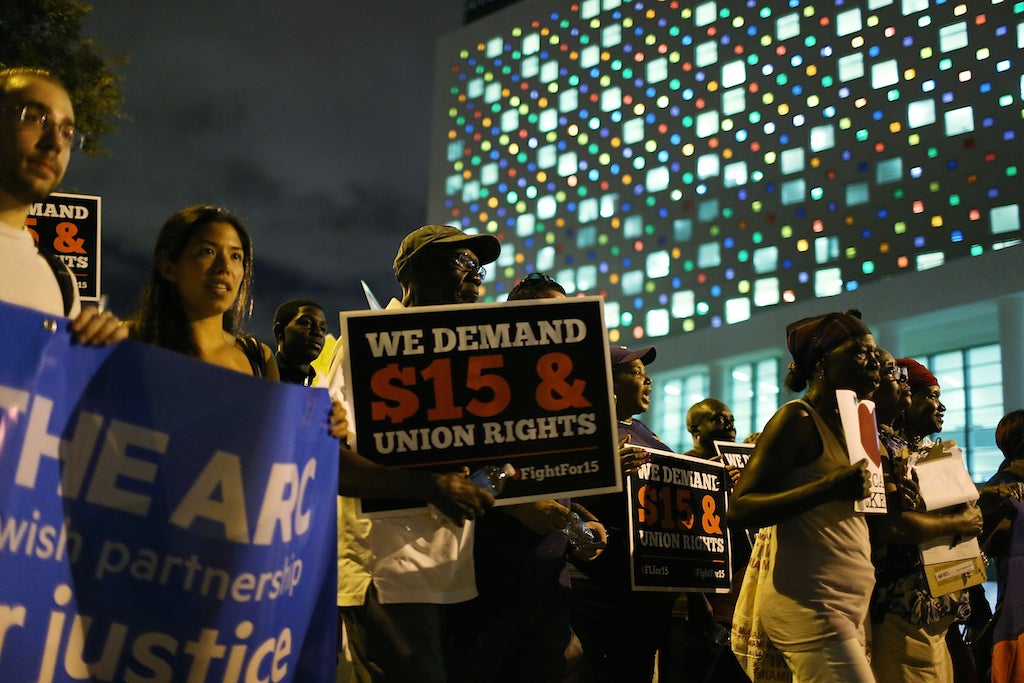Alabama senate blocks attempts to raise minimum wage in Birmingham
The law would have made a $10.10 minimum wage compulsory in the city

Your support helps us to tell the story
From reproductive rights to climate change to Big Tech, The Independent is on the ground when the story is developing. Whether it's investigating the financials of Elon Musk's pro-Trump PAC or producing our latest documentary, 'The A Word', which shines a light on the American women fighting for reproductive rights, we know how important it is to parse out the facts from the messaging.
At such a critical moment in US history, we need reporters on the ground. Your donation allows us to keep sending journalists to speak to both sides of the story.
The Independent is trusted by Americans across the entire political spectrum. And unlike many other quality news outlets, we choose not to lock Americans out of our reporting and analysis with paywalls. We believe quality journalism should be available to everyone, paid for by those who can afford it.
Your support makes all the difference.The state government in Alabama has blocked attempts by the city of Birmingham to increase the minimum wage.
City government in Birmingham, the largest city in Alabama, had passed legislation to raise the minimum wage to $10.10 per hour, from the federal minimum of $7.25 per hour. The law was to be introduced on 1 March.
However, the Alabama senate, which has a strong Republican majority, quickly enacted legislation forbidding cities or counties in the state to pass laws which raise the minimum wage, thereby preventing Birmingham’s efforts from coming into fruition.
In addition, the state legislation also means that employers cannot be compelled by law to provide leave or other benefits to workers, MSNBC reported.
Alabama will continue to use the federal minimum wage.
State senators voted 23-11 to introduce the ruling, which was signed off by State Governor, Robert Bentley.
Republican state senator Jabo Waggoner voted against the minimum wage hikes, arguing that higher rates would prevent economic development and that small businesses would not be able to afford the higher wages and have to close.
“We want businesses to expand and create more jobs – not cut entry-level jobs because a patchwork of local minimum wages causes operating costs to rise,” Mr Waggoner said to the Guardian.
He continued: “Our actions today will create predictability and consistency for Alabama’s economy, which benefits everyone.”
The move was criticised by opposition senators. Democrat state senator Linda Coleman-Madison said: “Alabama is a poor state. But I say we are poor by choice, because of bills like this that keep people poor.”
However, Democrats who unsuccessfully voted against the bill said that they would lobby for a higher minimum wage of $10.10 per hour across the state.
“Somebody has to recognise that we have a working-poor class of people that are not just in Birmingham,” Ms Coleman-Madison continued.
Alabama is one of the poorest states in the US.
A recent Business Insider ranking of all the 50 US state economies listed Alabama in the bottom five. The methodology took into account unemployment rates, GDP per capita, average weekly wages, recent growth rates for non-farm payroll jobs, GDP, house prices, and wages.
However, it did report that wages in the state grew 2.2 per cent between November 2014 and November 2015.
Join our commenting forum
Join thought-provoking conversations, follow other Independent readers and see their replies
Comments